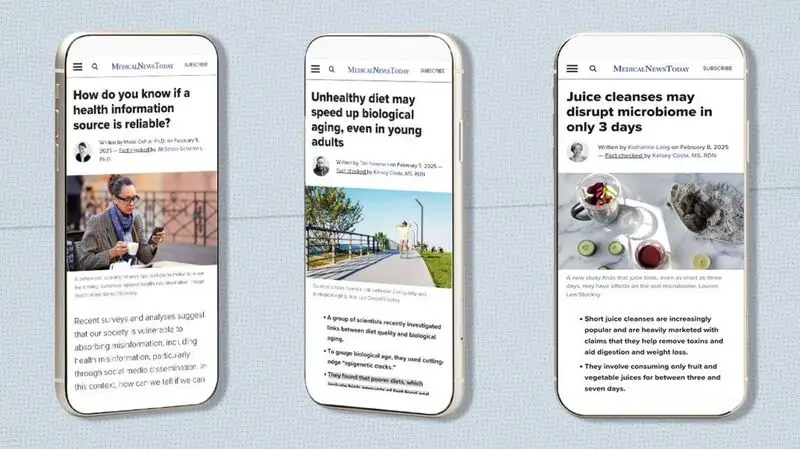
- We’ve rounded up this past week’s most noteworthy health and well-being news, focusing on nutrition, aging, and general well-being.
- Among these pieces of research are a study on diet’s impact on aging, the dangers of engaging in juice fasting, and how to combat false news amid an epidemic of misinformation.
- Experts caution against overestimating some of the findings as they may be a bit premature or involve only a small and select group of participants.
It can be hard to keep up with the latest news and developments going on in the world when the stream of information and notifications seems neverending.
When it comes to scientific studies on Health and well-being, Medical News Today tries to eliminate the guesswork of deciphering which ones relate to us as consumers by covering peer-reviewed research and preliminary findings that may need a balanced expert take.
Here are three picks and a few further reading suggestions that stood out to us among the latest medical news.
Our very own Maria Cohut spoke to Dawn Holford, PhD, a research fellow in the School of Psychological Science at the University of Bristol in the United Kingdom, to help readers spot signs of misinformation and learn ways to verify if health information is accurate.
Holford mentioned a practice called lateral reading, which can help people corroborate facts by using multiple sources, as well as empathetic refutation, which requires us to tap into our emotional intelligence.
What prompted this?
In the aftermath of the temporary pause on public communications from federal health agencies in January under the order of the United States Department of Health and Human Services (HHS), many people found themselves in a data and credibility void, searching for information sources that were accurate and reliable to access.
Any further reading?
For more information on the topic, I’d recommend keeping an eye out for our podcast this month on how to spot mis- and disinformation as well as the psychology behind it, which will also feature Jenny Yu, MD, FACS, Chief Health Officer for RVO Health, the parent company of Healthline, Healthgrades, and Optum Perks.
One particularly interesting recent study investigated the link between dietary quality and biological aging, which is a measure of how well someone is aging.
The results of this study suggested that following a diet high in fast food, processed red meat, and soda but low in fruits and vegetables may speed up aging, even in young adults.
Conversely, it also suggested that adding more fruits and vegetables could mitigate this and help slow down the aging process.
Is this new information?
Not necessarily. The food we consume has been linked to epigenetic changes in our DNA, which can affect how our body ages. What this study adds is that this effect can be observed even in young adults.
We’ve previously covered many studies that prove the link between a poor quality diet and accelerated aging. One such study from November 2024, which used data from the Moli-sani Study, found that following a diet with more than 14% of total calories coming from ultra-processed foods was linked to accelerated biological aging, based on 36 blood biomarkers.
Any further reading?
Earlier this month, we covered a study that, for the first time, showed how mitochondria act as “reservoirs” to hold NAD. NAD is the latest buzz in the longevity space and is a molecule that plays a role in creating energy in the body.
Experts we interviewed also weighed in on what they thought about NAD supplements and infusions for the readers who are curious to learn more.
Another study for those interested in learning more about supplements for aging, our article on daily omega-3 supplements and regular exercise to slow down aging is a worthy read.
Participants in this study took omega-3 supplements for 3 years and slowed their biological aging by 3 to 4 months, which was boosted further with exercise.
We live in a world where quick fixes for a variety of health problems or one-and-done solutions to improve health and vitality are booming. However, not all of these are safe or healthy for every single person out there.
The latest to question this is a study published in MDPI Nutrients, which has suggested that rather than being beneficial, juice cleanses may actually be harmful to health.
A juice fast or a juice cleanse is a practice that involves consuming only fruit and vegetable juices for 3–7 days.
What does this study add?
The findings indicate that just three days of a juice cleanse can alter a person’s gut microbiome, increase inflammatory bacteria, and decrease those that are beneficial to health.
One of these bacteria were Proteobacteria, which are associated with many inflammatory diseases, which increased after the fast, and Firmicutes, which help ferment dietary fiber, and these decreased.
“Juice cleansing diets are often low in calories (and may not provide enough energy for our daily needs) and although they may be high in vitamins and minerals, they tend to lack a variety of other important nutrients that the body needs,” Megan Mehnert, a U.K. Registered Dietician in Bristol, U.K., told us.
Is this study missing something?
Just because something is increasingly popular doesn’t mean it’s good for everyone. The heavy marketing surrounding such practices and strong claims such as “helping remove toxins, aiding digestion and weight loss” without enough scientific evidence is something readers should keep in mind when making their own decisions.
However, the study and its sample size were rather small, the intervention was short at 21 days, and the participants studied might not represent the general population well.
If you’d like to know more about the pros and cons of juice fasts, read this.





